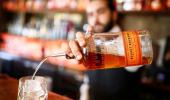'Our approach has been to work with consumers and help them drink better, not more.'

Diageo, the UK-based alcoholic beverage company, that acquired Bengaluru's United Spirits Ltd (USL) in 2013, is bullish on India.
Armed with its popular line-up of spirits including McDowell's, Royal Challenge, Smirnoff, and Godawan, Diageo India is focussing on premiumisation of its brands as well as expanding its existing portfolio.
Vikram Damodaran, Chief Innovation Officer (CIO), Diageo India, talks about the company's growth strategy and expansion plans, in an interview with Ayushman Baruah and Aneeka Chatterjee/Business Standard in Bengaluru.
Where does USL stand in India today after its acquisition by Diageo?
We are coming up on the ninth year since the acquisition. USL is important for Diageo for three reasons - first, India will be the youngest, high-population economy and the fastest-growing economy in the world.
We produce 20 million new legal drinking consumers a year.
This translates to 25 per cent of the world's population turning the legal drinking age of 21.
So, that itself is a strong reason why India is a strategic and long-term market for Diageo.
The second reason is the rise of affluence.
Over the last two decades, India has steadily grown in terms of its capability to be much more discerning and spend more on bespoke experiences that come because of value creation, job creation, higher per capita, and the ability to fundamentally synchronise and connect globally due to the reach of data in India.
India is no longer a country following trends but also creating trends, globally.
Last, as far as alcoholic beverages are concerned, we are at that point of inflection where consumption trends are driving innovation across the economy to create new propositions that are rooted in Indian authenticity and craft.
What is your strategy to strengthen your portfolio?
USL is focused on premiumising our portfolio. We have fundamentally shed our volumes business and started focusing on our value business.
So, everything in prestige and above, starting with McDowell's No. 1 upwards to the likes of Johnnie Walker and Talisker, is part of our value-driven portfolio rather than volume-driven.
Our approach has been to work with consumers and help them drink better, not more.
It is not that we are pushing volumes in the market but pushing better propositions into the market.
With a lot of emerging home-grown brands like Amrut, how does the competition look?
India is home to many good homegrown brands. In Whiskey, there is Amrut, Paul John, Indri, and Rampur.
As per the last count, there were some 30 different Indian single malts in the market.
Then, there is the Gin segment whose revolution started in India about 8 years ago.
Beyond that we are seeing the advent of Rums that are completely crafted in India.
Then, we have the rise of microbreweries and craft beer. Today, we have close to 100 microbreweries in Bengaluru alone and about 800 across India. There are two takeaways here.
First is that India has moved beyond being just a whiskey market.
Every segment is beginning to grow and people are looking for a wide variety of experiences.
Second, we have the largest footprint in the country in terms of distillation capacity, sales force, and marketing capability.
Therefore, from a competition standpoint, we look at not just merely competition but a healthy growth of the alcobev sector.
Hence, our role in India is not just about organic propositions but also to nurture the ecosystem of startups to help grow alcobev as a sector.
What are your expansion plans in the non-alcoholic beverage segment?
Our definition of non-alcoholic spirits is a spirit's substitute. For example, Seedlip is a global brand, a non-alcoholic distilled spirit, which is churned from green peas and botanicals.
Our range of non-alcoholic spirits includes Tanqueray 0.0, Guinness 0.0 and Gordon's 0.0.
In India, we haven't really entered into the non-alcoholic spirit segment in a big way.
We launched Seedlip through our distributor, as a test case.
We believe that non-alcoholic spirits are a growing trend in India, certainly something we are watching closely and evaluating the right fit for the market.
What is your focus on the domestic vs. international market?
Diageo India is made up of local jewels and global giants. Local jewels include McDowell's No.1, the largest-selling whiskey by volume in the world, along with Royal Challengers or Signature.
Global giants include brands like Johnnie Walker and Smirnoff.
So, we focus on both domestic and international markets.
Regarding global markets, the biggest advantage of our portfolio of Indian products is the large Indian diaspora globally.
Today, in most developed economies across the globe like Europe or the US, most of the affluent Indians settled there are also looking for well-crafted Indian experiences which opens up global opportunities for us.
Second, the alcobev sector from India is hugely unexplored globally and there are a lot of opportunities.
Today, the majority of our revenues are from the domestic market but we export to over 16 countries globally.
We see global revenues as a big future bet for our portfolio.
Feature Presentation: Aslam Hunani/Rediff.com













 © 2025
© 2025